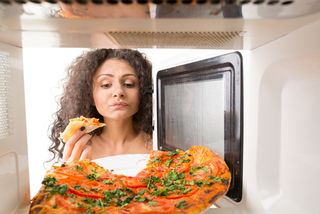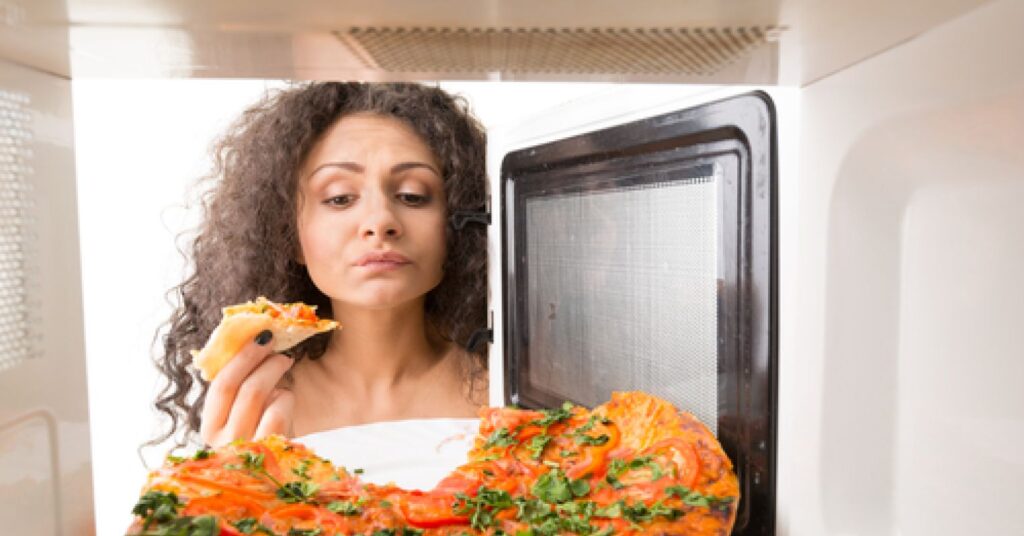
Source: Shutterstock
Who among us hasn’t reached for the cookie jar during a painful breakup or binged on potato chips after working a couple of 10-hour days? Emotional eating, which can be defined as eating high fat, salty or sugary foods to soothe negative emotions is a common but unhealthy way of coping with stress. According to the 2014 “Stress in America” survey released by the American Psychological Association, 1 in 3 Americans (33%) reported overeating or eating unhealthy foods during the past year as a result of stress. Emotional eating contributes to obesity and excess sugar may make us more prone to inflammation, which creates risk for heart disease, diabetes, and depression. Why do so many of us end up bingeing late at night or lying on the couch with a tub of ice cream when stress gets the better of us? Below are six reasons for emotional eating and some tools to help you stop.
Lack of Time or Money
When we are stressed, we generally have too much to do in too little time, impending deadlines, and little time for self-care. You may not have time to eat much during the day and be too hungry when you get home at night. You don’t want to think about what to cook for a meal or take the time to prepare it. You have little time to shop for food and you feel too hungry to wait for the food when you get home. As a result, the fast food place or frozen food aisle, or the bag of cookies can be a very tempting, although far less healthy alternative. In 2014, money and finances were the biggest source of stress for Americans, according to the APA survey. If money is scarce, you may opt for the cheaper processed foods, which are higher in fat, salt, and sugar, versus the more expensive fruits and vegetables.
Lack of Mindfulness
Stress makes us rush around trying to multitask or move from one task to the next without a break. Your brain’s “fight or flight” response urges you to keep going without taking a break. This leads you to be “unmindful” of what you are doing because all your attention is focused on the task that needs to get done or the bill that needs to get paid. You may eat three or four cookies before you even realize it. Or you may try to multitask and eat while you are typing on your computer, checking your cellphone or answering emails. This results in just stuffing the food down unconsciously without even tasting it properly. Your brain is less likely to catch the signals that you are full and you feel less satisfied, so you are more likely to overeat mid-afternoon or when you take a break at night.
Lack of Sleep
According to the 2014 APA “Stress in America” survey, 42% of Americans reported “laying awake at night”because of stress. Stress about money, relationships, work, or health causes us to worry about what’s going to happen. And we know that worry is a major cause of insomnia. If you drink caffeinated drinks or coffee to stay awake, or alcohol to unwind, your sleep cycle will be even more disrupted. Sleep is also a powerful factor influencing weight gain or loss. Lack of sleep may disrupt the functioning of ghrelin and leptin—chemicals that control appetite. Not getting enough sleep makes us feel more grumpy and depressed, which can make us more likely to run to the cookie jar to soothe our feelings. Not sleeping well also erodes our willpower and ability to resist temptation. In one study, overweight/obese dieters were asked to follow a fixed calorie diet and assigned to get either 5 and a half or eight and a half hours of sleep a night (in a sleep lab). Those with sleep deprivation lost significantly less weight.
Cortisol
Stress creates a “fight or flight” response, causing our bodies to release of a cascade of chemicals, including adrenaline and cortisol. These chemicals prepare you to fight your attacker or run away, since the types of stresses our ancestors dealt with her mostly marauding lions and tigers. In the short-term, adrenaline helps you feel less hungry as your blood flows away from the internal organs and to your large muscles. However, once the effects of adrenaline wear off, cortisol, known as the “stress hormone,” hangs around and starts signaling the body to replenish your food supply. As a result you get more hungry for foods high in fat, salt, or sugar, that provide a “quick fix.”
Lowered Metabolism
Stress lowers your body’s metabolism, so that there is more glucose around to provide energy for fighting or fleeing. Our ancestors faced a scarce food supply, so our bodies got wired to hang onto fat, especially the layers of visceral fat around your belly, which protect your internal organisms. So you may put on weight when under stress even if you don’t eat any more than usual. This can lead to feelings of helplessness and depression that make you want to do more emotional eating! Excess belly fat also releases chemicals causing inflammation, which negatively affects your overall health, so you may feel more tired or have less will-power.
Late-Night Eating
Stress makes us more likely to overeat at night because we get too hungry during the day from not taking time to eat. You may also be staying up later watching TV because you can’t fall asleep. The evening is a high-risk time for emotional eating because we have used up our willpower during the day and have less of it left to keep us from snacking after dinner or having that second helping. A study by John De Castro, a psychology professor at the University of Texas showed that food is less satisfying and has less satiety when eaten late at night than during the day, so we are more likely to keep eating.
How to Overcome Emotional Eating Under Stress
Below are some strategies to help you overcome emotional eating under stress:
♦ Eat meals on a regular schedule. Those who eat late at night are less likely to have regular meal and snack times.
♦ Plan your meals. Poor planning can cause you to eat junk food because you don’t have the energy to shop for and cook healthy food or because there’s no healthy food left in the fridge.
♦ Eat Mindfully. Mindful eating means sitting down to eat a meal and not multi-tasking while you’re eating so you can pay attention to the food. Deliberately focus on what you’re hungry for, whether it’s food or emotional comfort. Focusing on the taste of each bite helps you tune into your body’s intuitive signals so you’re more likely to know when you’re full.
♦ Be Aware of Your Trigger Foods. Most of us have foods we particularly crave that trigger us to overeat. High sugar foods like doughnuts can cause your blood sugar to spike and then crash, leading to more hunger down the road. Try to keep those foods out of the house or to take only a small portion and then put the rest in a less accessible place.
♦ Drink Less Alcohol. Drinking too much alcohol causes you to put on weight. Alcohol also disinhibits you so you’re more likely to throw caution to the wind and eat those junk-y foods. Alcohol also depresses your mood for up to three days following a drink.
♦ Practice Stress-Management. Instead of using food and alcohol to unwind after a stressful day, plan other relaxing activities. Go for a walk or to the movies, build up a regular exercise routine, meet a friend, take a hot bath or light a scented candle. Learning to meditate by focusing on your breath can also lessen mental stress, and meditation has been shown to lower blood pressure if practiced regularly.
Resources
Greenberg, M. Why We Gain Weight When We’re Stressed and How Not To
Albers, Susan (2015). 50 More Ways to Soothe Yourself Without Food
Melanie Greenberg, Ph.D. is a practicing psychologist in Mill Valley, California, and and former Professor of Psychology at the California School of Professional Psychology. She is an expert on positive psychology, mindfulness, managing stress, and improving relationships . She provides workshops, speaking engagements and psychotherapy for individuals and couples. She regularly appears on radio shows, and as an expert in national media. She also does long-distance coaching via the internet. She is the author of The Stress-Proof Brain (New Harbinger, 2017).
Copyright: Melanie Greenberg, PhD 2015. All rights reserved.

